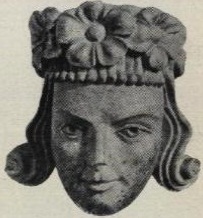Haakon V
| Haakon V Magnusson | |
|---|---|

Contemporary bust of Haakon (as duke) from the Stavanger Cathedral, dated to the 1280s.
|
|
| King of Norway | |
| Reign | 15 July 1299 – 8 May 1319 |
| Predecessor | Eric II |
| Successor | Magnus VII |
| Born | 10 April 1270 |
| Died | 8 May 1319 (aged 49) |
| Burial | St. Mary's Church, Oslo |
| Consort | Isabelle de Joigny Euphemia of Rügen |
| Issue |
Ingeborg, Duchess of Halland Agnes Haakonsdatter |
| House | Sverre |
| Father | Magnus VI of Norway |
| Mother | Ingeborg of Denmark |
Haakon V Magnusson (10 April 1270 - 8 May 1319) (Old Norse: Hákon Magnússon; Norwegian: Håkon Magnusson) was king of Norway from 1299 until 1319.
Haakon was the younger surviving son of Magnus the Lawmender, King of Norway, and his wife Ingeborg of Denmark. Through his mother, he was a descendant of Eric IV, king of Denmark. In 1273, his elder brother, Eirik, was named junior king under the reign of their father, King Magnus. At the same time, Haakon was given the title "Duke of Norway", and from his father's death in 1280, ruled a large area around Oslo in Eastern Norway and Stavanger in the southwest, subordinate to King Eirik. Haakon succeeded to the royal throne when his older brother died without sons.
In 1295, Haakon married firstly with Isabelle, daughter of Jean I, Count of Joigny, but she died in 1297 without issue. In early 1299 he married secondly with Euphemia, daughter of Vitslav II, Prince of Rügen, who in 1301 bore him his only legitimate daughter, Ingeborg Håkonsdotter, since 1312 wife of duke Eric Magnusson of Sweden, a younger brother of King Birger of Sweden. Their son, Magnus Eriksson would succeed Haakon V as king of Norway. He also had an illegitimate daughter named Agnes Hákonardottir.
During Haakon's reign, Oslo gradually took over the functions of capital of Norway from Bergen, though there was no official pronouncement of this at any time. Haakon is also associated with the construction of Akershus Fortress (Akershus Festning) and Bohus Fortress (Båhus festning). During his reign he revived his brother's war policy against Denmark, but in 1309 he finally concluded a peace that in general was the end of a period of Dano-Norwegian wars. In domestic matters he energetically and successfully tried to limit the power of the magnates and to strengthen the king's power.
...
Wikipedia
